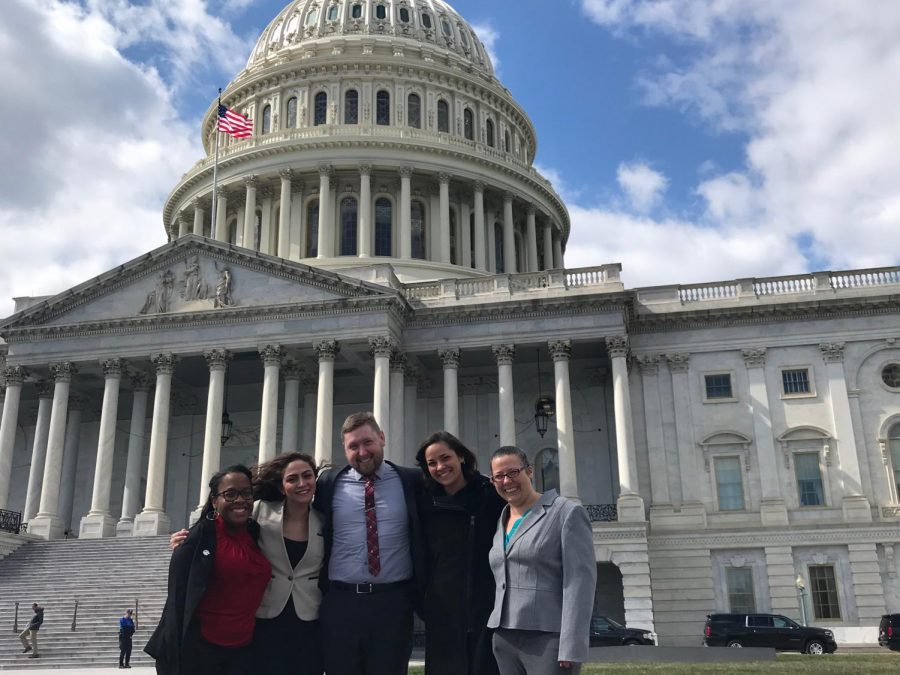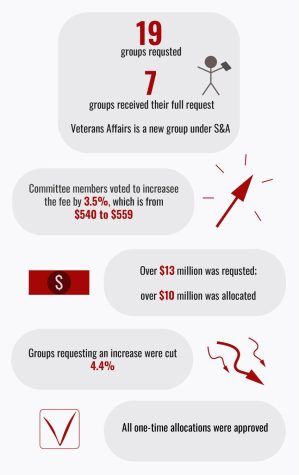Grads oppose PROSPER Act in DC
Some students say they would not be able to afford proposed repayment plans
From left: Candace Chappelle, Shima Bahramvash Shams, Joshua Munroe, Jennifer Johnson and Shannon Kozlovich met with lawmakers to discuss proposed changes to higher education.
March 23, 2018
A group of WSU graduate and professional students traveled to Washington, D.C. over spring break to lobby against a bill that could limit available loans and affect loan repayment plans.
Members from the Graduate and Professional Student Association attended a national summit to advocate against the Promoting Real Opportunity, Success and Prosperity through Education Reform Act.
The summit included two-day informational sessions and a congressional visit to meet with representatives on Capitol Hill.
Joshua Munroe, GPSA vice president of legislative affairs, said the PROSPER Act contains many appealing proposals for conservatives, but would be harmful for both current and prospective students of higher education at the undergraduate and graduate levels.
One of the proposals in the PROSPER Act is placing a cap on the amount of loans graduate and professional students are able to obtain, Munroe said. Graduate and professional students would only be allowed to take out $28,500 a year and $150,000 in loans over the course of their education.
“It sounds like it may not be breaking the bank for some folks, but this is particularly harmful for people who want to do advanced degrees,” Munroe said. “You need loans to cover masters, Ph.D., professional degrees — it just wouldn’t be able to cover it.”
Another proposal is the removal of current loan repayment plans, Munroe said. Under the PROSPER Act, current repayment plans would be eliminated and replaced by a new income-based repayment plan, according to Section 466 of the act.
“Without having a good loan repayment plan or a graduated loan rate … some people would be paying back almost $2,000 a month just to pay off their loans,” Munroe said. “It’s like three times the rent that I’m paying right now. There’s no way in hell I’ll be able to do that.”
Munroe said education is vital for students to live the best lives they can, but the PROSPER Act might prohibit students from achieving that goal.
“This bill in its current form, it seems like it will only advantage people who are able to pay for their education independently,” Munroe said. “People who have connections and people who are from non-marginalized groups, historically.”
Rep. Virginia Foxx, R-N.C., proposed the PROSPER Act in December. The intent of this legislation is to reauthorize and overhaul the federal programs and regulations of the Higher Education Act according to a handout provided by Munroe.
HEA provides federal aid to students and programs in postsecondary education, according to the Congressional Research Service report.
Munroe said they heard the PROSPER Act might not pass, which also means HEA would not be reauthorized this year either. First passed in 1965, HEA has seen updates and undergone reauthorization in 1998, 2003 and 2008. He said not revisiting HEA could mean the bill is outdated.
“We want to at least have those rules reauthorized,” Munroe said, “so that colleges and universities have effective guidance going forward.”
The PROSPER Act passed the House Committee on Education and the Workforce and is currently waiting for a vote by the entire chamber.
“There just aren’t the votes in the house to pass it at this point in time,” Munroe said, “which is good for us.”
He said the proposed higher education overhaul does not match up with the needs of graduate and professional students.
“It’s a bad assumption to make [that] if you get a Ph.D., you’re going to be making six figures off the bat,” Munroe said. “That’s not true for almost all of us, which is why we need to have advocacy, and that’s why we’re much more policy-focused.”


















